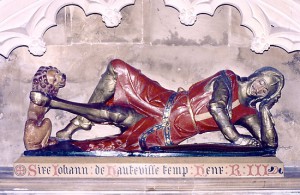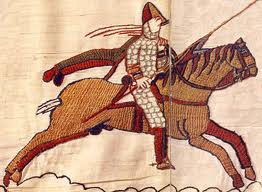What happened to Tancred’s other sons?
 Tancred de Hauteville’s claim to fame is his remarkable fecundity. He produced at least twelve sons, three of whom (William Iron-Arm, Robert Guiscard, and Roger the Great Count) would achieve nearly legendary status and go on to found the richest kingdom of the medieval Mediterranean world. But what happened to the other nine?
Tancred de Hauteville’s claim to fame is his remarkable fecundity. He produced at least twelve sons, three of whom (William Iron-Arm, Robert Guiscard, and Roger the Great Count) would achieve nearly legendary status and go on to found the richest kingdom of the medieval Mediterranean world. But what happened to the other nine?
All but three of them eventually made their way to southern Italy. Since Tancred had two wives (Muriella and Fressenda), the family was effectively divided into two generations. Tancred’s first wife (Muriella) gave birth to five sons: Serlo, Geoffrey, William, Drogo, and Humphrey, while his second wife bore the next seven: Robert, Mauger, William (the younger), Aubrey, Humbert, Tancred, and Roger. The oldest boy Serlo (some sources call him the youngest) displayed the family penchant for fighting at an early age. After killing his neighbor over an insult, he was exiled for three years, but by 1041 had rehabilitated his image enough to inherit his father’s entire estate. This meant that the other boys had to seek elsewhere for their fortune, which started the exodus south.
Geoffrey left first with his half-brothers Mauger and William (the only two who seem to have gotten along with the older generation), and was present at the battle of Civitate where the Normans decisively defeated the Pope’s forces. All three of them were rewarded for their part in the struggle. Geoffrey was made Count of Apulia which he held until his death around 1071 (the same year his oldest full brother Robert Guiscard conquered Bari and evicted the Byzantines from Italy). His younger son Ralph crossed over to England with the Conqueror and was present at the Battle of Hastings. He would eventually settle in Wiltshire and found the English branch of the family.
Mauger got the old Byzantine Province of Foggia, but he didn’t enjoy it for long. He died shortly after a campaign against the Byzantines and his property went to the younger William who already ruled the Principality of Salerno. William proved quite successful- and by some accounts survived into the twelfth century- but his most important act was to invite his youngest brother Roger to Italy.
The most prestigious of the boys (after the Iron-Arm, Guiscard, and Great Count) were Drogo and Humphrey who both served as Count of Apulia and Calabria. Drogo inherited the position from William-Iron-Arm, and when he in turn was assassinated, Humphrey took up the mantle, triumphantly leading the Normans in the battle of Civitate. Humphrey did his best to contain the ambitions of his half-brother Guiscard, but when that proved impossible he entrusted his sons to him. In the best Norman tradition Guiscard promptly confiscated the inheritances and left the boys to fend for themselves.
The last two brothers- Aubrey and Tancred- seem to have stayed in Normandy, perhaps inheriting what was left of the family estate. As a fitting endnote, the oldest brother’s son (Serlo) made his fortune helping the youngest brother (his uncle Roger) conquer Sicily. Young Serlo fought notably for at least twelve years before he fell in an ambush. The place where he was killed- a large flat rock carved with a simple cross- was named after him for nearly nine centuries before a construction firm blew it up in the 1960’s.
